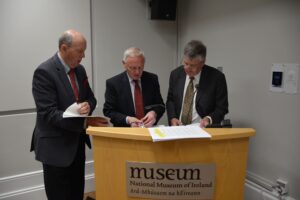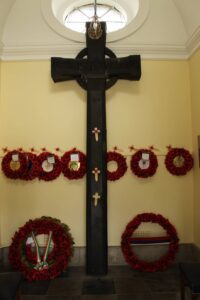Colonel Dorcha Lee (Retd), a valued member of The Military Heritage of Ireland Trust (CLG), presented “Gallipoli’s Long Shadow”, which was first broadcasted on RTE Radio 1’s Sunday Miscellany Programme, on 31 August 2015. The text of the presentation is published below with the kind permission of the RTE Authorities and Colonel Lee (Retd).
As a youngster in the fifties, I was very much aware of Gallipoli, when I used to visit my Granny Eily at Pembroke Lodge, the Richardson family home in Dundrum. Her brother, my grand-uncle, Michael Richardson, left this house to join up during WW1, in late 1914. Michael enlisted in ‘D’ Company, 7th Battalion, Royal Dublin Fusiliers, nicked-named “The Pals”, and arrived, after several months in training and staging posts, at Gallipoli during the summer.
He missed the first rounds of fighting when the beachhead was secured and settled into trench life, writing letters home during the quiet periods. Most of the letters that survived were addressed to his older sister Molly, my grandmother. In the letters, there were references to the birth of his nephew and Godchild, Ferdy (my father), just four months earlier in May 1915. Michael was so proud to be ‘an uncle’.
It was while writing one of these letters home, sitting under a tree near his trench, that Michael was killed by artillery fire. He was the only fatality that day in the Sector. It was the
4th of September, only a few weeks before the withdrawal from Gallipoli began.
In those days the bodies of dead soldiers were not repatriated, the principle being that “soldiers lay where they fell”. The British Army kept this policy right up to and including the
Falklands War in 1982. In contrast, the Irish Defence Forces have always had the policy of repatriating their dead from overseas missions. Nowadays, whether at Brize Norton or the Mortuary at Dublin Airport, the families take centre stage in the reception of their loved ones. The focal point of their grief will be a grave in Ireland, and they will be present when military honours are rendered.
Back in 1915, without a grave, the family created a very simple memorial to Michael’s memory in Pembroke Lodge. Set up just off the kitchen, it contained his personal items brought home from Gallipoli by a comrade, including his Army cap, belt, photographs, and some bits and pieces. Still there in the fifties, I remember there were no candles or flowers, just his kit. It lay there on the little table, as if waiting for him to return and pick them up.
Five years later, in 1920, in the very same kitchen, Michael’s younger sister, Eily, prepared meals for IRA men on the run, always in the kitchen, and always late at night. In was during
a different war, the War of Independence. The visitors, who included General Michael Collins, and his young nephew Volunteer Sean Collins-Powell, would come over the back
wall and through the garden.
In 1922, Molly died in a flu epidemic, and Eily took over the raising of young Ferdy, marrying her sister’s widower, Fred, twelve years later in 1934, just before Ferdy reported to
The Military College at the Curragh as an Army cadet. When Fred died in 1954, Eily returned to live in Pembroke Lodge.
We lived in Athlone then, where my father was stationed with the Army. Once when Eily was visiting, my father invited Sean Collins-Powell, by now a Colonel and Officer Commanding Western Command, home to tea.
“CP”, as he was known in Army circles, and my Granny Eily, had a great time reminiscing about the old days, and being on the run in South Dublin with his Uncle Mick. As a young teenager steeped in all things military (I was later to serve 42 years in the Army myself), I listened, fascinated.
I asked him if he remembered the memorial to Uncle Michael in Pembroke Lodge. Of course, he said, that was why we used Pembroke Lodge. It was a safe place to be. The Richardsons had no connection to the Cause, and would be regarded as loyalists by Dublin Castle, having lost a son for King and Empire.
And so it was, that, having served his King and Empire, Michael‘s death in Gallipoli, in a small way, inadvertently helped the emerging Irish state.
Michael Richardson, civil servant, rugby player, and soldier, was 20 years old when he died.





